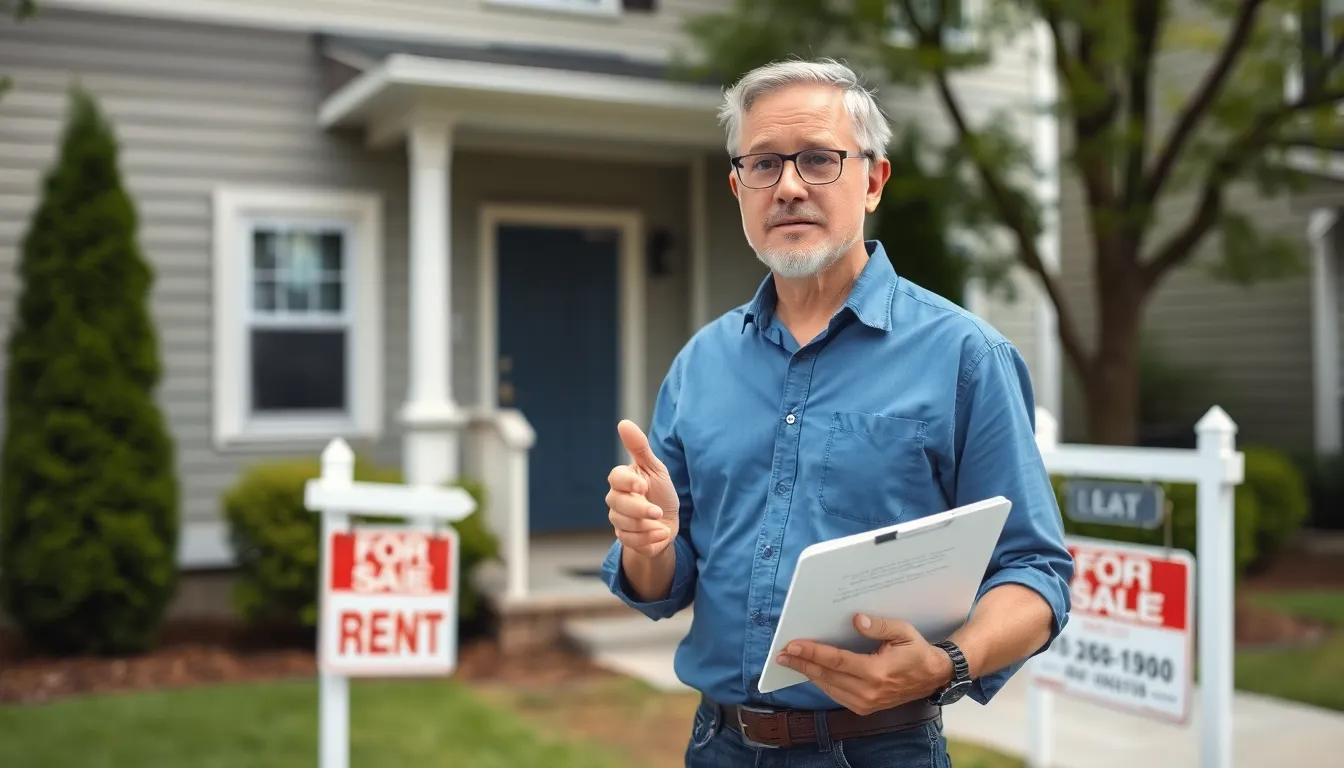Navigating the world of landlord licensing can feel like trying to assemble IKEA furniture without the instructions—confusing and a little frustrating. Yet understanding these requirements is crucial for anyone looking to rent out properties. From ensuring tenant safety to avoiding hefty fines, getting licensed isn’t just a bureaucratic hurdle; it’s a smart move that can save headaches down the road.
Table of Contents
ToggleOverview of Landlord Licensing Requirements
Landlord licensing varies by state and local jurisdiction, emphasizing the need for landlords to understand specific regulations. Statutory requirements often include background checks, safety inspections, and proof of insurance. Many areas mandate landlords to complete landlord training programs, providing essential knowledge about tenant rights and property management.
Licensing fees differ significantly based on location. For example, some cities charge annual fees ranging from $50 to several hundred dollars. These costs ensure local governments can enforce rental regulations effectively. Penalties for renting without a license can reach thousands of dollars, making compliance crucial.
Specific documentation often includes tax identification numbers, property deeds, and lease agreements. Some jurisdictions require proof of compliance with local building codes and regulations. Engaging with local housing authorities provides clarity on necessary paperwork and helps navigate the licensing process smoothly.
Property types influence licensing requirements, as some locations differentiate between single-family homes and multi-unit dwellings. Multi-unit properties may have stricter guidelines, including fire safety regulations and maintenance standards. Researching local requirements ensures landlords meet all obligations, creating a safer rental experience for tenants.
Understanding licensing requirements contributes to better property management practices, fostering positive landlord-tenant relationships. Licensed landlords often benefit from legal protections, simplifying disputes or evictions. Overall, obtaining a license enhances credibility in the rental market and demonstrates commitment to tenant safety and welfare.
Importance of Landlord Licensing

Landlord licensing plays a crucial role in rental property management. It establishes a standard for safety and professionalism within the housing market.
Protecting Tenants
Tenant protection stands as a primary goal of landlord licensing. Licensing requires landlords to adhere to local health and safety codes, ensuring properties remain habitable. Compliance with these codes fosters a safe living environment, lowering potential hazards such as mold or faulty wiring. Many licensing programs mandate safety inspections, which identify and rectify issues before they impact tenants. These measures instill confidence in renters, knowing their rights are protected and their living conditions are secure.
Ensuring Compliance
Compliance with landlord licensing requirements safeguards both tenants and landlords. Many jurisdictions impose fines and penalties for operating without a license, emphasizing the importance of adhering to regulations. Proper licensing helps landlords stay informed about changing laws and best practices in property management. Engaging in required training programs enhances awareness of tenant rights, reinforcing respectful landlord-tenant relationships. Recognizing the significance of compliance not only mitigates legal complications but also bolsters a landlord’s reputation in the market.
Types of Landlord Licenses
Understanding the different types of landlord licenses is fundamental for compliance and effective property management. Various licenses exist that correspond to property types and local regulations.
Residential vs. Commercial
Residential licenses cater to landlords renting residential properties. This category includes single-family homes, apartments, and multi-family units. Specific regulations often address tenant safety and habitability standards. Commercial licenses apply to landlords managing non-residential properties like office buildings, retail establishments, and warehouses. These licenses typically involve different requirements, such as zoning laws and business regulations, focusing on ensuring public safety and operational standards for commercial enterprises.
Local vs. State Requirements
Licensing can vary significantly at local and state levels. Many states have overarching laws governing landlord practices, however, local jurisdictions may impose stricter regulations. For instance, city requirements might include additional safety inspections and more detailed documentation, impacting the overall licensing process. Landlords must review both local ordinances and state laws to ensure complete compliance. Missing either set of requirements can lead to potential fines and legal issues, emphasizing the importance of thorough research and understanding of the full landscape of landlord licensing.
Steps to Obtain a Landlord License
Navigating the process to obtain a landlord license involves specific actions and requirements. Understanding the application process and gathering necessary documentation is vital for successful compliance.
Application Process
Completing the landlord license application varies by jurisdiction, so potential landlords must check local regulations. Filling out forms typically requires personal information and details about the rental properties. Submitting the application usually requires payment of a fee, which varies from one area to another. Scheduling interviews or orientation sessions may also occur in certain localities. Processing times differ, with some jurisdictions taking weeks while others can provide licenses more quickly.
Necessary Documentation
Providing essential documentation is crucial for the application. Tax identification numbers serve as a primary requirement for most landlords. Proof of ownership, such as property deeds, helps establish legitimacy. Background checks often demand comprehensive personal details, including criminal history and credit reports. Insurance documentation, specifically liability coverage, tends to be mandatory in many areas. Meeting these documentation requirements enhances the chances of a smooth application process.
Consequences of Non-Compliance
Non-compliance with landlord licensing requirements leads to significant consequences. Authorities often impose fines for operating without a license, which can range from hundreds to thousands of dollars, depending on the jurisdiction. Besides financial penalties, landlords face increased scrutiny from local housing agencies. Violations may result in mandatory property inspections, which can uncover additional issues that lead to further fines or legal action.
Losing the right to rent affects landlords directly. They risk eviction of current tenants, leading to loss of rental income. Legal disputes often arise between landlords lacking licenses and dissatisfied tenants, causing reputational damage in the community. An unlicensed landlord may also face difficulties in securing tenants. Renters often prefer properties managed by licensed landlords, as they perceive these homes to be safer and more compliant with health regulations.
Educational requirements may also pose compliance challenges. Landlords not adhering to licensing regulations miss out on vital training programs that provide knowledge on tenant rights and property management best practices. This knowledge gap can lead to mismanagement of properties and strained landlord-tenant relations.
Failure to comply can also result in property confiscation in extreme cases. Local governments may take necessary action against landlords that repeatedly neglect licensing laws. Additionally, ongoing non-compliance could lead to criminal charges and lasting damage to a landlord’s ability to operate legally in the future.
Understanding the repercussions of non-compliance emphasizes the importance of adhering to licensing regulations. Staying informed about local and state requirements protects landlords from costly penalties and fosters more secure rental environments.
Navigating landlord licensing requirements is essential for anyone in the rental market. Compliance not only protects landlords from hefty fines but also ensures the safety and well-being of tenants. By understanding the specific regulations in their area and obtaining the necessary licenses, landlords can foster positive relationships with renters and enhance their reputation.
Staying informed about changes in local laws and completing required training can further empower landlords in their roles. Ultimately, embracing these licensing requirements is a proactive step toward building a sustainable and successful rental business.







